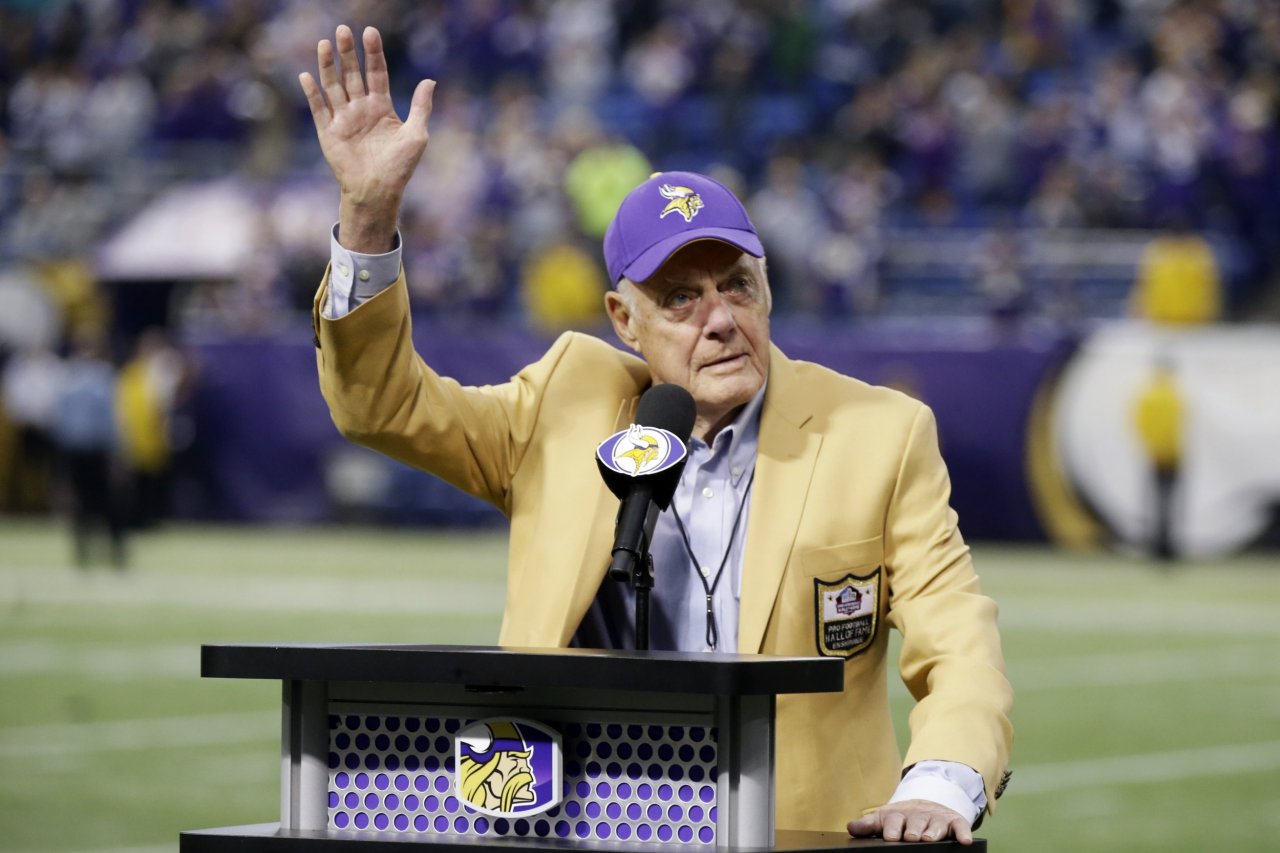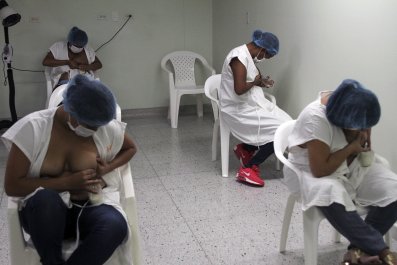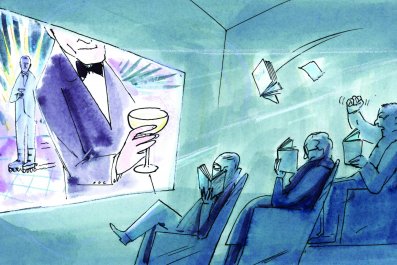The garage sale kicks off at 5 p.m. today, May 20, which also happens to be the 88th birthday of its host, Bud Grant. "That's just a coincidence," says the former Minnesota Vikings coach.
It's a yard sale, really. Most of the items, plumbed not only from Grant's home on Oakmere Road in Bloomington, Minnesota, but also from those of his six children and 19 grandchildren, will be displayed on either the sloping driveway that is the length of a Fran Tarkenton pass or on his front lawn. Bud's Bazaar, a vernal tradition now in its 10th year, will continue throughout the day Thursday before closing on Friday at noon.
Don't let the calendar fool you: This is no spring cleaning. If you want Grant, a Hall of Famer best remembered for having coached the Vikings to four Super Bowls in the 1970s, to autograph your purchase, that will run you an extra $25. "Some people have garage sales to get rid of junk," says Grant with the slightest trace of a grin. "I have garage sales to make money."
The handshake remains firm. The eyes, keen and blue. The hair is white, but then wasn't it always? Grant went turkey hunting in Nebraska last month and bagged three gobblers. He maintains an office at the Vikings facility in nearby Eden Prairie.
And yet, Grant disappeared from the public eye 30 years ago, when he retired from coaching. He shuns the spotlight and declines every invitation to opine about the Vikings' (mis)fortunes on local radio. He has turned down so many appearance requests from the NFL that, "they've stopped asking me."
So why is Bud Grant having a garage sale? Everyone who knows and loves Grant, from his son Mike, who has led Eden Prairie (Minnesota) High School to 10 state championships in football; to his former defensive end Jim Marshall, who set an NFL record for most consecutive games played (282) but confoundingly still finds himself not enshrined in the Pro Football Hall of Fame, will tell you the same thing: Bud Grant does not need a dime.
Why does a man who does not want for earthly riches—Grant owns nearly 500 acres of terra firma in neighboring Wisconsin—spend the week of his 88th birthday staging a flea market in his front yard?
"Hey," says Grant, fixing you with those Siberian husky eyes and a delicate tone of admonishment. "Everything has value."
'Shoot the Dog'
You can digest all 263 pages of Grant's 2013 autobiography, I Did It My Way, and learn nothing about the Vikings' four Super Bowl defeats between 1970 and 1977. You will, however, discover what Grant, a Depression-era baby born and raised in Superior, Wisconsin, loved best about playing high school sports: "I could take a shower every single day."
You will not find a sentence noting the Vikes' 11 NFC Central championships in a 13-year span under Grant's guidance. You will spot nary a clause noting that Bud Grant once intercepted five passes in a game as a member of the Winnipeg Blue Bombers of the Canadian Football League, which remains a pro football record. You will, however, learn that in his second and final season with the Philadelphia Eagles in 1952, Grant earned $7,000 (he neglects to mention that, as a converted defensive end, he caught 56 passes, second-best in the league). "I'll earn a lot more than that with this garage sale," he says with satisfaction.
Truly valuable items, Grant does not casually discard. This house? He has lived here since 1967, his inaugural season as Vikings coach (How many Hall of Fame NFL coaches, by the way, would even want the public to know where they live, much less invite them over to haggle over the price of duck decoys?). Grant's wife, Pat, who died a few years ago from Parkinson's disease, was married to him for 60 years. His best friend, iconic Twin Cities sports impresario Sid Hartman, 94, has been his sidekick since Grant's first day of college at the University of Minnesota—where he was a three-sport star.
An avid hunter, Grant used the same Winchester 50 12-gauge shotgun for 30 years. "It started catching and I brought it in to be repaired," Grant recalls. "The man at the store said, 'I can't fix it for you. You wore out the barrel.'"
Frugal? On game days Grant would have an assistant round up the leftovers of the steak-and-eggs breakfasts the Vikings were served so that he could bring the meat home to his dogs. Grant spent Sunday afternoons matching wits against Vince Lombardi, George Halas, Tom Landry and Don Shula, but he always returned to the rambler on Oakmere Road with a doggie bag.
Grant was equally frugal with verbiage. Dave Osborn, a hard-nosed but athletically limited running back, once asked Grant, who had led the CFL in receiving three of his four seasons, how to improve as a pass-catcher. "Concentrate," replied Grant, who then walked away.
Hall of Fame quarterback Fran Tarkenton once walked into Grant's office and confided that he was having trouble getting his dog to behave. Grant looked up just long enough to say, "Shoot the dog."
"Once, during a game, I got into a heated argument with one of our assistant coaches," says Marshall, who still lives in Minneapolis and maintains a close relationship with Grant. "I walked up to Bud on the sideline and started pleading my case. He just looked down...and spit on my shoe. That was the end of it."
Grant grins knowingly at the memory, then says, "I didn't have time to argue."
Keep your head down, and keep your mouth shut. That has always been Grant's way. "If you talk, you only repeat something that you already know," he says. "But if you listen, you may learn something that you don't know."
Here's something you may not know: Bud Grant is the only man to have played in both the NBA and the NFL. Ever. Before his 25th birthday he was both a member of the world-champion Minneapolis Lakers, feeding entry passes to George Mikan, and a member of the Philadelphia Eagles, lining up at defensive end in front of linebacker Chuck Bednarik.
Here's something else you may not know: Bud Grant was the NBA's first hardship case—he dropped out in December of his senior year to join the Lakers. His first shot, taken on Christmas night, was a half-court buzzer-beater that swished. He was also the NFL's pioneer contract holdout.
One more item: Grant became a head coach in the CFL before his 30th birthday. While south of the U.S.-Canada border his epitaph may read, "Lost Four Super Bowls," north of it they remember him as the man who led the Blue Bombers to four Grey Cup championships.
Bud Grant is an ESPN 30 for 30 documentary waiting to be made, and that is before you come to the chapter of his stewardship of the Vikings. And yet he glosses over his football career, both as player and coach, and his basketball career, and even his baseball career—he was an outstanding pitcher. Grant only becomes garrulous when World War II is mentioned.
"The day after high school I was off to basic training at the Great Lakes Naval Station," he says. "You gotta understand, we didn't care about sports. We wanted to win the war. We wanted to win the war! And at the time, we didn't know if we would."
Stories pour out. Of the friend who died in the first wave of infantry that landed on Tarawa in the Pacific. Of another who shot down 40 Japanese aircraft then perished in a test-piloting mission. Of a third man, "Rabbit," who was on the crew of the last sub to disappear in the Pacific before the Japanese surrendered.
His bright blue eyes begin to well up a little. "I never use the word hero in sports. Hero is way above star. I save star for sports. Sports is entertainment, that's all it is."
In Grant's rookie NFL year, 1951, he led the Eagles in sacks. His locker was next to that of Bednarik, one of the fiercest men to ever play the game. The two became good friends. "We used to go out for a beer after practice. Now you have to remember, Chuck Bednarik flew 25 missions as a waist gunner on a B-17, you know, a Flying Fortress, over Europe. Then, even though he'd fulfilled his quota, he flew 10 more.
"So we'd have a beer, and Chuck would pull out a pen. Now, remember, crews used to name their bombers, like Memphis Belle. Every day Chuck would pull out a pen and on a napkin or a piece of paper he'd write down the name of every bomber that had gone down over Europe. Every one he could remember. He'd be crying, this man who everyone in the NFL feared. And he'd just say, 'I can't let these guys be forgotten.'"
Strangely enough, Grant's tour of duty extended only to San Francisco, where he was stationed when V-J Day came. He did see action, though. "There was a prison uprising at Alcatraz, and I drove the Marines over there in a landing craft to quell the riot," he says. "I am the only serviceman I know with an American Theatre ribbon."
If you are old enough to recall those vintage Vikings squads of Grant's in the '70s, you will recall the white-haired (he began going gray in high school), stoic presence on the sidelines. You might remember that he forbade his players to wear gloves or long underwear, and he banned sideline heaters at Metropolitan Stadium, no matter how arctic the chill. "If they didn't have to worry about what to wear," explains Grant, whose teams went 19-6 at the Met after December 1, "it was one less thing to worry about."
You could be forgiven for thinking he was a grim presence, a martinet, even. You would be wrong. While Grant insisted, as the title of his autobiography suggests, that players do it his way—"Shoot the dog" was not just about a dog, and Grant intended for Tarkenton to spread the message—he also understood when to add some slack to the leash. During one pre-game meal, future Hall of Fame defensive lineman Carl Eller, the scariest man ever to don Vikings purple, decided that he had had enough of steak and eggs. Eller demanded pancakes.
"Moose [Eller's nickname] is telling the waiter to bring him pancakes," recalls Marshall. "And the waiter is terrified, but he's telling him that he is not allowed to do that. Coach's orders."
At last, Eller stood up and theatrically overturned his table, and stomped out of the room. An entire team's eyes turned to the coaches' table.
"Well," said Grant, "it looks like Moose is ready to play."
Marshall who, like Eller, was part of that famed Purple People Eaters defensive line, still smiles at the memory. "If I found out tomorrow that the country was being attacked or that some type of apocalypse was upon us, the first thing I'd do is look for Bud Grant.
"When Bud got here, he came in and laid down some rules," says Marshall, "and I said, 'Whatever you need, Boss.' I bought a ticket to the ride. We all did."
Bud Grant turns 88 years old today. All sales are final. And please do not ask to use the bathroom. The answer is no.





















